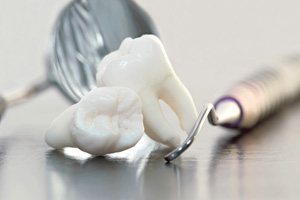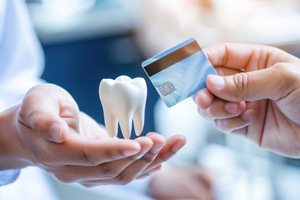
Wisdom Tooth Extractions – Belmont, NH
Preserve Your Oral Health with Wisdom Tooth Removal
Every year, countless individuals must get their wisdom teeth — their third set of molars — removed. In fact, this procedure has become something of a rite of passage for many young adults. It is often regarded as a necessary and urgent service because most people’s mouths are simply too small to accommodate their wisdom teeth. If the teeth are left in place, they may lead to a number of complications. We can prevent such issues and preserve your oral health with wisdom tooth removal in our Belmont, NH, dental office.
Why Choose the Center for Contemporary Dentistry for Wisdom Tooth Extractions?
- Sedation Options Available
- Experienced Team of Dental Professionals
- Prevent Future Oral Health Problems
What Are Wisdom Teeth?

Wisdom teeth are the third molars, located at the very back of the mouth. They typically develop when a person is in their teenage years, significantly later than when the rest of their permanent teeth come in. Most people have four wisdom teeth, but the number can vary. A small percentage of people have no wisdom teeth at all.
Why Do Wisdom Teeth Need to Be Removed?

It is worth noting that wisdom tooth removal is not always necessary. Some people can retain their third molars for a lifetime and suffer no ill consequences because of them.
However, wisdom tooth removal is often vital for an individual’s oral health. If a person’s mouth is too small to accommodate these teeth, they can become impacted (stuck beneath the gumline). They can cause a number of oral health problems, including infections, cysts, dental misalignment, jaw stiffness and swelling, difficulties with oral hygiene, and more.
What to Expect From the Wisdom Teeth Procedure

In some cases, we are able to remove wisdom teeth using the same techniques that we use for other teeth. This involves lifting the teeth with an instrument called an elevator, griping them, and gently breaking the tissues that hold them in place.
Often, though, wisdom teeth are fully or partially impacted (stuck beneath the gum line), so we may have to create an incision in the gums in order to remove them. Then, we gently extract the teeth while disturbing the surrounding tissue as little as possible. We use anesthesia and sedation to make sure our patients feel little to nothing during the procedure.
Recovering From Wisdom Teeth Extraction

Most people are fully recovered from their wisdom teeth extractions within 1 -2 weeks. In the meantime, you may experience some swelling, soreness, and intermittent bleeding.
Our team will give you instructions to help you enjoy a smooth recovery. For example, you will need to eat a soft diet, avoid the use of drinking straws, take prescribed medications, and abstain from cigarettes and other types of smoking. Your diligence will encourage your body to heal and minimize your risk of post-op complications.
Understanding the Cost of Wisdom Tooth Extractions

The cost of wisdom tooth extractions is not the same from case to case. After we get to know the details of your unique situation, we can provide a personalized cost estimate. We will also be happy to help you understand your payment options, which may include things like financing, insurance, and our Essential Dental savings plan. Remember, even though wisdom tooth removal can cost a substantial sum of money, it can be vital for protecting your oral health and preventing future dental care expenses.
Factors That Can Impact the Cost of Wisdom Tooth Extractions

The cost of wisdom tooth extractions can depend on:
- The number of teeth that need to be removed. Many people get all four of their wisdom teeth removed at once. However, some people never develop four wisdom teeth; they might have just one or two. Other people choose only to remove the wisdom teeth that are currently threatening their oral health.
- Wisdom teeth are often stuck (impacted) in the jawbone or soft tissue. The type and level of impaction present can affect your treatment plan and the overall costs of your care.
- Many people opt to be sedated during wisdom tooth removal. We offer two types of sedation, which can vary in price.
- The doctor performing your procedure. We can handle the vast majority of wisdom tooth removals in-house, so you will not need to worry about dealing with the pricing structure of an outside specialist.
Does Dental Insurance Cover Wisdom Tooth Extractions?

Very often, yes, dental insurance does cover wisdom tooth removal. It is usually classified as a major procedure, so up to 50% of its cost may be covered, up to the amount of your plan’s annual maximum. Our team welcomes insurance, and we are in-network with many popular plans. We will be happy to help you figure out how you can use your benefits and keep your out-of-pocket expenses to a minimum.
Other Options for Making Wisdom Tooth Extractions Affordable

Insurance is just one provision that can make wisdom tooth extractions more affordable. Other possibilities include:
- We accept payment plans from CareCredit and Sunbit.
- Essential Dental plan. This discount plan, designed for patients without insurance, can reduce the cost of most of the services offered in our practice.
Wisdom Tooth Extractions FAQs

If you suspect that you need to get your wisdom teeth removed, we are ready to consult with you. In the meantime, you might want to know more about the road ahead. The following list of FAQs provides valuable information about wisdom teeth and the extraction procedure. If your questions are not addressed here, reach out to us directly. We look forward to speaking with you!
Why Do We Have Wisdom Teeth?
The most commonly accepted theory about why we have wisdom teeth relates to the diet of our ancient ancestors. Thousands of years ago, early humans had to exist on a diet of raw and rough foods, like berries, nuts, roots, and raw meat. Having a third set of molars at the back of their mouth equipped them to eat effectively.
Today, the human diet is softer and easier to consume. Therefore, wisdom teeth have become unnecessary. Human mouths have also become smaller over time, so most people do not have space to accommodate their wisdom teeth.
Does Everyone Have Wisdom Teeth?
Most people develop four wisdom teeth, one in each quadrant of their mouth. However, some people have as few as one wisdom tooth, while some people have extra wisdom teeth. A number of people never develop their wisdom teeth at all. Genetics seem to be a strong influencing factor when it comes to whether or not a person gets their third molars.
Keep in mind that even if you cannot see your wisdom teeth, you might still have them. Often, an X-ray is required to determine whether they are present.
How Do You Make Wisdom Teeth Pain Go Away?
The only permanent way to address wisdom teeth pain is to get them removed. Before your surgery, though, you can take steps to minimize your discomfort. For example, a cold compress on the side of your face can help to numb pain and reduce inflammation. Over-the-counter pain medications can also be effective. Rinsing with warm salt water is good for fighting bacteria and soothing sore tissues. Additionally, it is important to maintain thorough oral hygiene so as little food as possible gets stuck around your wisdom teeth.
What Is the Best Age to Get Wisdom Teeth Removed?
Wisdom tooth removal tends to be easiest for adolescents and young adults. People in this age range often heal faster from the procedure.
As you grow older, the wisdom teeth can become more embedded in your bone and become more challenging to remove. However, there is no upper age limit for wisdom tooth extractions. The procedure can be successfully performed on individuals in their 30s, 40s, and older.